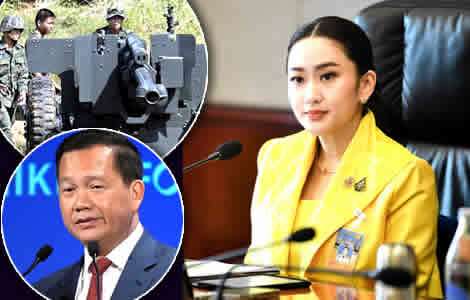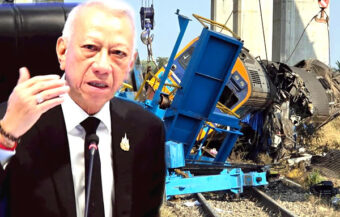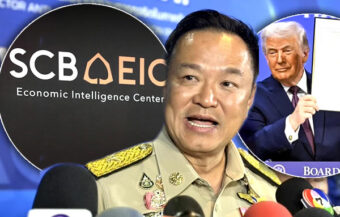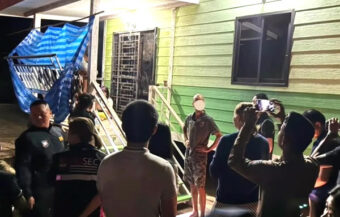Cambodia stuns Thailand by sidelining border talks and pushing for an International Court of Justice (ICJ) case on disputed land. Troops mass near Sisaket, cultural bans take hold and 500,000 Cambodian workers being recalled. Bangkok reels as diplomatic options shrink ahead of Sunday deadline as talks are due to wrap up.
Border tensions between Thailand and Cambodia escalated on Saturday, as Cambodia appeared to sideline ongoing talks and its military adopted a more aggressive posture toward Thai positions. Simultaneously, Prime Minister Hun Manet firmly declared that Cambodia would not discuss the four disputed territories at the heart of the conflict. Instead, he announced plans to unilaterally submit the issue to the International Court of Justice (ICJ). Notably, analysts suggest the submission date may come on Sunday June 15th — the anniversary of the 1962 ruling, a decision widely regarded in Thailand as a national humiliation.

Despite renewed border talks in Phnom Penh, relations between Thailand and Cambodia are rapidly deteriorating. The much-anticipated Joint Boundary Commission (JBC) meeting, which began on June 14, has done little to ease tensions.
The meeting was the sixth of its kind but the first in over 12 years. Cambodia hosted the session, with hopes of restarting cooperation on border issues. However, the atmosphere shifted quickly from diplomatic optimism to political and military unease.
From the outset, the talks faced challenges. Although both sides agreed the dialogue was “friendly,” underlying mistrust surfaced early. On Saturday afternoon, Cambodian delegates reportedly suspended talks, citing a “unilateral” communication by the Thai side.
Confusion surrounds Cambodian suspension of talks as Thailand awaits full Foreign Ministry clarification
The nature of this alleged move remains unclear. Nevertheless, it triggered confusion among Thai officials. According to government sources, Bangkok is still analyzing details and consulting with the Ministry of Foreign Affairs.
The Ministry of Foreign Affairs itself has stated that while all went well, it would not give a full report to the media until talks concluded on Sunday.
Meanwhile, Prime Minister Paetongtarn Shinawatra remained engaged. She followed developments closely from Bangkok. Government spokesperson Jirayu Huangsap confirmed that the prime minister received continuous updates from her diplomatic team in Phnom Penh.
Paetongtarn expressed confidence in the JBC delegation, led by former ambassador Prasarn Prasarnvinitchai. She urged the team to protect Thailand’s national interests while pursuing peace.
In parallel, the Ministry of Foreign Affairs reported that small group technical meetings had started smoothly. According to officials, these discussions were expected to lay the groundwork for more sensitive issues. The Thai side hoped the JBC framework would help reduce tensions and restore cooperation.
Hun Manet refuses to discuss four disputed areas, vows to file case with ICJ on symbolic June 15 or this Sunday
However, those hopes were short-lived. On Saturday also, Cambodian Prime Minister Hun Manet made a bold declaration. He stated that four disputed border areas would not be discussed during the JBC meeting.
Instead, he announced plans to refer the matter directly to the International Court of Justice (ICJ). This move, he said, would take place on June 15 — the 63rd anniversary of the ICJ’s 1962 Preah Vihear ruling.
That ruling awarded Cambodia sovereignty over the ancient Preah Vihear temple. It relied heavily on French colonial maps, which Thailand had failed to dispute in time. The court cited the legal principle of estoppel, concluding that Thailand’s claim was invalid.
That case was first taken in 1954.
Since then, Thailand has rejected the ICJ’s jurisdiction in related cases. Nonetheless, analysts in Bangkok believe Cambodia intends to use this precedent again. If Thailand refuses to join, Cambodia plans to proceed unilaterally.
Cambodia warns it will act unilaterally if Thailand refuses ICJ jurisdiction in the long-standing border land dispute
However, it is not clear if it can do this if Thailand refuses to accept the jurisdiction of the court.
According to Hun Manet, the four areas in question — Ta Muen Thom, Ta Muen Tod, Ta Kwai, and the Emerald Triangle — are no longer subject to negotiation. He posted online that Cambodia had already decided to submit the case. He warned that Thailand had until Sunday to agree or be excluded.
Furthermore, Hun Manet stressed that other bilateral issues — such as border closures — would not be discussed at the JBC. He claimed those matters lie outside the committee’s scope. According to him, Thailand alone can resolve them by reopening border crossings.
He concluded his statement with a warning: “Whoever starts first must stop first — no need for negotiations.”
This rhetoric has alarmed Thai officials. It suggests Cambodia may be leveraging nationalist sentiment and public pressure to strengthen its domestic political standing.
Indeed, some observers believe that the Cambodian government is seeking to rally public support. Hun Manet, alongside his father and Senate President Hun Sen, has increasingly consolidated power. Cambodia’s ruling family also controls the military, which remains firmly aligned with the government.
Thai government struggles with internal divisions as Cambodia presents a unified and assertive front
In contrast, Thailand’s political scene is more fragmented. There are growing signs of tension between the civilian government and the Royal Thai Army. Prime Minister Paetongtarn and Foreign Minister Maris Sangiampongsa are pushing for a peaceful solution. However, internal divisions threaten to derail these efforts.
Deputy Prime Minister and Interior Minister Anutin Charnvirakul is reportedly flexing his political muscles. Cabinet insiders suggest a looming reshuffle could remove his Bhumjaithai Party from powerful ministries. In particular, the Ministry of the Interior which Mr Anutin holds. This internal friction further complicates Thailand’s ability to present a unified front.
Meanwhile, the Thai military on Saturday raised concerns over Cambodian troop movements. On June 14, Major General Winthai Suvari reported that Cambodian forces had advanced near the Sisaket border.
In particular, troops were spotted in the areas of Prasat Don Toul and Satta Som, near Ban Phum Sorol in Sao Thong Chai subdistrict. Artillery was reportedly positioned so it could fire into Thai territory.
Thai army warns of security threat as Cambodian troops and artillery in border areas change direction of fire
The army spokesman labelled this deployment a “security threat.” In response, the Royal Thai Army is urgently adjusting its posture. Additional forces have been mobilized along key stretches of the border.
Although no shots have been fired, the situation remains volatile. Military officials warn that any miscalculation could escalate the conflict rapidly.
Notably, Cambodia has also taken action beyond the battlefield. In recent days, the government announced restrictions on Thai cultural exports. Thai films and Muay Thai fighters have been banned from appearing in Cambodia. There are also reports of a boycott of Thai goods.
Additionally, Cambodian officials have threatened to cut electricity and internet services supplied by Thailand. These measures are viewed as economic retaliation, aimed at pressuring the Thai government to back down.
In addition, Hun Manet on Saturday further revealed that his government was seeking the repatriation of Cambodian workers in Thailand. Significantly, there are 500,000 such workers, according to the Bangkok Minister of Labour. They are vital to Thailand’s economy.
Cambodia eyes repatriation of its workers from Thailand as pressure builds through economic retaliation
Prime Minister Hun Manet on Saturday also spoke of banking loans for such returnees, as well as training and transport to their homes.
Such steps underline the growing assertiveness of the Cambodian regime. With centralised control and limited internal opposition, the ruling family appears ready to pursue an aggressive foreign policy.
By contrast, Thailand’s democratic structure imposes more constraints. The Shinawatra-led coalition must balance competing factions and manage public expectations. This weakens Bangkok’s ability to respond swiftly or forcefully.
Nevertheless, Thai diplomats remain committed to dialogue. The Ministry of Foreign Affairs continues to highlight past successes of the JBC mechanism. These include coordinated demarcation efforts and infrastructure projects that benefit both countries.
Officials hope these examples will remind Cambodia of the value of cooperation. However, with the ICJ submission looming, the window for diplomacy may be closing fast.
Thai response to ICJ threat remains pending as diplomats race to salvage talks before Sunday’s deadline
As of Saturday night, the Thai government had yet to issue a formal response to Cambodia’s legal threat. The Foreign Ministry said it was still evaluating the implications of the proposed ICJ move.
Meanwhile, Thai media has begun questioning the government’s preparedness. Critics argue that the current administration has failed to anticipate Cambodia’s aggressive strategy.
Rome wants electricity and internet cut off to areas of Cambodia along Thailand’s border to show strength
Thai-Cambodian border tensions left unresolved. Conflict is still on the table as visa periods for nationals are cut
Rome calls for a wider and more decisive response to Cambodia’s antics on the border after the latest clash
Cambodian FM appeals to Thailand’s Foreign Minister to let the border dispute be decided in The Hague
Some even suggest that Prime Minister Paetongtarn has underestimated the severity of the crisis. Her supporters, however, insist she is working tirelessly behind the scenes to safeguard national interests.
With the JBC talks set to continue into Sunday, the pressure is mounting. Both sides remain at a critical juncture. If Cambodia proceeds with the ICJ filing as promised, bilateral relations could suffer long-term damage.
Whether diplomacy can succeed in this atmosphere of threats and military manoeuvres remains to be seen. For now, the region waits anxiously for what the next day will bring.
Join the Thai News forum, follow Thai Examiner on Facebook here
Receive all our stories as they come out on Telegram here
Follow Thai Examiner here
Further reading:
Dangerous impasse between Thailand and Cambodia as PM rules out International Court of Justice (ICJ)
Hun Manet confirms Cambodia ultimately may decide to send border dispute with Thailand to the Hague
Khmer soldier killed in deadly gunfire between Thai and Cambodian armies near Ubon Ratchathani


















